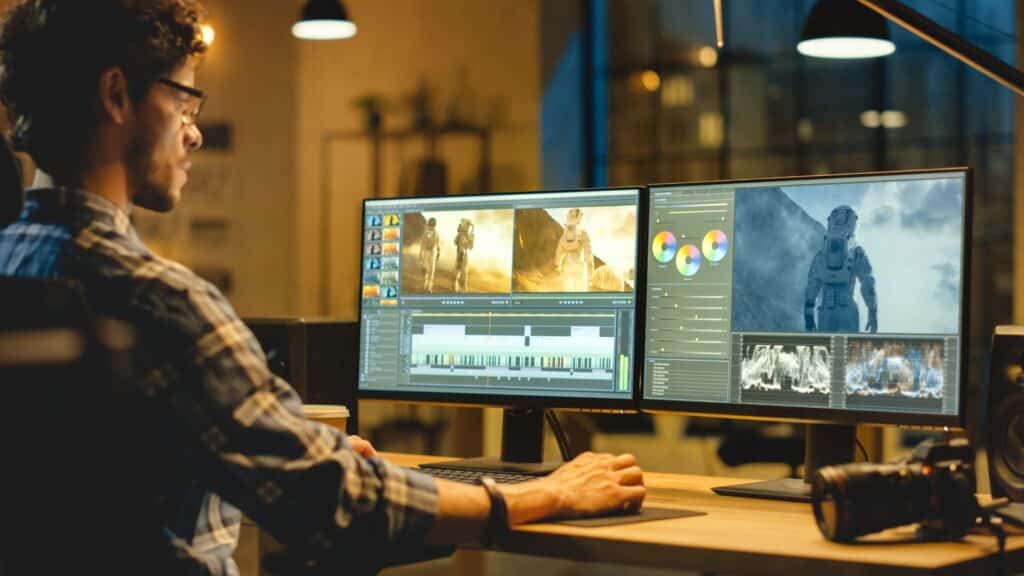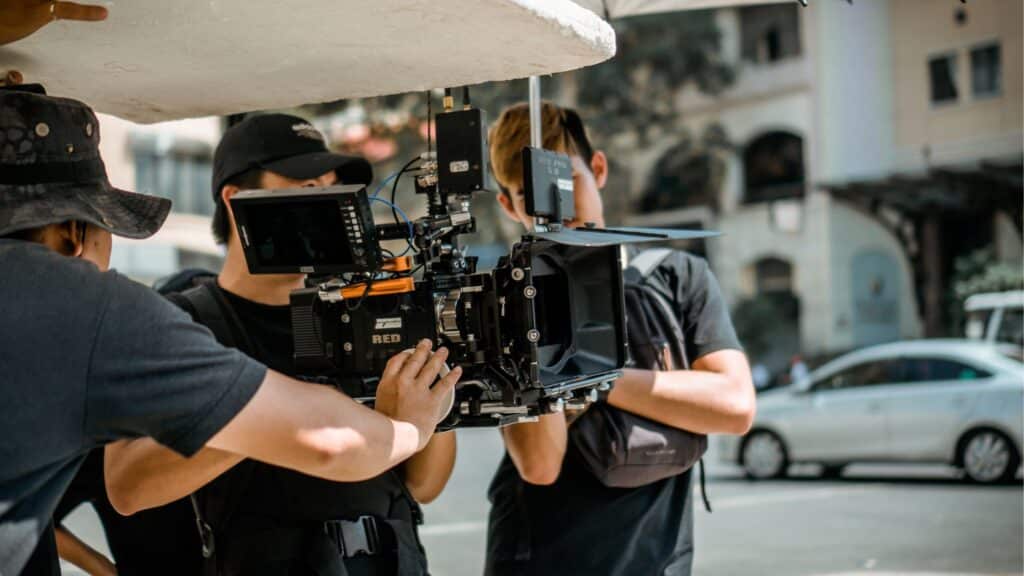OK, So Exactly How Long Does It Take to Learn Filmmaking?
Written by Colette Nichol, Solo Filmmaker and Story Strategist
Estimated reading time: 6 minutes
Embarking on a journey in filmmaking is an exciting! The path to becoming a filmmaker is filled with creativity. (And a lot of ups and downs.) As a beginner, you might wonder how long it takes to learn filmmaking. You even be wondering whether you’ll ever master the skills needed to be a full-time filmmaker and turn this passion into a career. So, let’s discuss.

Learning Filmmaking Does Take Time
Most film school programs that are part of conservatory rather than a university are 1-2 years long.
While most university filmmaking programs are 3-4 years long. As an online solo filmmaking educator and video creator, I’ve had the experience of helping my mentorship students go from beginner to advanced.
It usually takes 200 hours of shooting and editing to gain a solid skill set as a solo filmmaker.
Keep in mind that as an independent or solo filmmaker, there’s a lot to learn. 200 hours doesn’t give you mastery of every filmmaking skill. Instead, it gives you a foundation upon which you can build. When it comes to learning filmmaking, doing the skills and then assessing your work is everything. You can’t learn filmmaking without taking action.
To become and outstanding filmmaker – either as a solo filmmaker or independent filmmaker – typically takes 10 years of consistent effort. However, to become a master will take a lifetime.
Usually filmmakers hit their stride after 15 to 20 years of working on their craft.
But that’s not a bad thing. And that’s how long most professions take. Mastery doesn’t arrive overnight. It takes work, dedication, passion, and a willingness to assess your skills and improve them. It take openness and the acceptance that some of your work will flop, and that’s okay.
Starting as a Beginner
The first step in learning filmmaking is to start creating.
With today’s technology, even a smartphone can be your gateway into film production. Start by making short films, experimenting with different styles and techniques. Engage in self-study, online courses, and workshops. Remember, learning filmmaking is a continuous process that evolves with experience and practice.
I recommend working on shot sequencing and understanding how to put together your shots so that they work in the edit. I also strongly recommend getting started with editing. You’ll learn way faster if you shoot and edit.

Timeframe to Become a Filmmaker
The time it takes to become a filmmaker (not a master) depends on your existing skills and dedication.
Some may feel competent after a few months of intensive practice and study, while others may take years to feel confident.
If you’re attending a formal film school, programs can range from two to four years. However, becoming a filmmaker is less about formal education and more about continuous learning and experience.
If you’re interested in learning solo filmmaking in a small group mentorship program, please CLICK here to check out our program in the Story Envelope Academy.
Studying Filmmaking
Studying filmmaking can be formal (through film schools or university courses) or informal (self-taught, online courses, mentorships). Formal education typically ranges from two to four years, but the learning doesn’t stop after graduation. Filmmaking is an ever-evolving field, requiring ongoing education and adaptation.
Is 25 Too Old to Start?
Absolutely not! Filmmaking is an art form that welcomes individuals of all ages. Many successful filmmakers didn’t start their careers until their late 20s or even later. Your life experiences can actually enrich your storytelling capabilities. In my opinion there is no such thing as too early or too late. Get started at any darn age!
Difficulty in Breaking Into the Industry
Breaking into the filmmaking industry can be challenging, as it’s highly competitive and often relies on networking and portfolio quality.
However, with persistence, continuous learning, and a passion for storytelling, it’s entirely possible to make your mark. I’d recommend focusing on building up your skill set while also building up your network. Don’t expect to get far without skills. In addition, you can also create your own work as you make your moves to get into the industry in a more formal capacity.

Making Money While Studying Filmmaking
While studying filmmaking, you can seek out opportunities for making money that include freelance projects and assistant roles.
These not only provide income but also invaluable practical experience. The key is to start small and gradually build your portfolio and reputation.
Personally, I decided to get paid to learn filmmaking by starting a business. As I increased my skills and the quality of the gear I worked with I was able to charge more. Now I run my business full time! But that path is not for everybody. Choose what works for you.
Are Film Studies Worth It?
Pursuing film studies may be worth it if you’re passionate about filmmaking and committed to the craft and do not have to go into serious debt to pay for it.
Formal education can provide structured learning and networking opportunities, but it’s not the only path to success in this field. Practical experience, self-driven learning, and networking can be equally valuable.
Please keep in mind that your formal film studies may cost you $100,000 or more.
And that might be a very hard pill to swallow if you’re just making $20 and hour when you graduate. Be very careful about joining a university program that will put you in debt for years.
As a filmmaker, you’re an artist. And as an artist you will be good times and lean times. You don’t want to be in over your head when it comes to debt while also pursuing a path in the arts.
Final Thoughts
The journey to becoming a filmmaker is not cookie cutter.
It can take months to years, depending on your learning path, dedication, and the opportunities you seize. Where you live will make a difference. There is no ONE single right path. And there is no ONE precise length of time for every aspiring filmmaker.
But regardless of your age or background, with hard work, continuous learning, and a hard-core positive attitude you can carve out your place in the world of filmmaking.
Persistence is the most important trait any filmmaker can have.
So develop that, and you’re ready for a lifetime of filmmaking!
More Filmmaking Articles
⭐ Best Lens for Video Hands Down
⭐ Best Camera for Beginners for Filmmaking, Photography, and Content Creation
⭐ Absolutely Essential Filmmaking Basics for Beginners – Epic Post

About the Author
Hi! I’m Colette Nichol. I’m a solo filmmaker and story strategist based out of rainy Vancouver, Canada. I’ve been making videos and micro films for small businesses and global brands since 2014.
Plus, I LOVE to help aspiring filmmakers pursue their dreams and start making films. This blog is designed to help you gain the knowledge you need to become a filmmaker.
If you want more, get on the waitlist for the Story Envelope Academy Solo Filmmaking Mentorship Program. It opens up one time per year and is the best way to become a filmmaking or video pro fast!
CLICK HERE to get on the solo filmmaking mentorship waitlist.